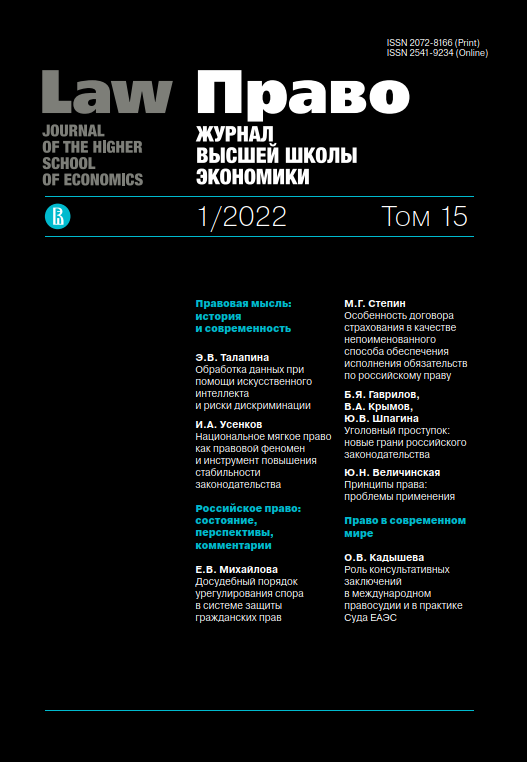The Peculiarity of the Insurance Contract as an Unnamed Way of Ensuring the Fulfillment of Obligations in Russian Law
Abstract
The article examines insurance as a way to ensure the fulfillment of obligations under Russian law. The author explores the classification of security structures, different points of view of scientists are compared, using the system and functional methods of interpretation of legal norms, which further helps to unlock the potential of using insurance as a security structure of the main obligation. An insurance contract can act as an unnamed way of securing the main obligation, corresponding to the signs of accessory (system), which are formulated by the legislator in Article 329 of the Civil Code of the Russian Federation. However, the author draws attention to the fact that in the past, in such documents that were in force before the adoption of the modern Civil Code of Russia, there was no indication of signs of accessory in the legislation. The article proves that accessory, (system) acting as a system method can only be applied to unnamed ways of ensuring the fulfillment of obligations, and also the use of such legislative signs of accessory specified in Article 329 of the Civil Code of the Russian Federation (termination, connectedness, invalidity), which must correspond to the unnamed method of securing the obligation, is argued. It is not possible to apply accessorism to all named obligations, since all seven named ways of ensuring performance of obligations (forfeit, surety, deposit, security payment, independent guarantee, retention, pledge) cannot be reduced to a single feature, and this contradicts the principle of consistency. The article concludes that it is possible to use an insurance contract as a method of securing the performance of an obligation. The author also takes into account the fact that the insurance contract has certain features that are inherent in this obligation, which is expressed in the mandatory presence of specific risks from which insurance is carried out. As a result, a new concept is introduced-conditional accessory. A conditional-accessory method of securing the performance of obligations is an insurance contract that is concluded as a method of securing the performance of obligations not against all existing risks of non-performance (improper performance), but only against those specified in the insurance contract.
References
Akinfeeva V.V., Stepanchenko A.V. (2020) Ways of securing obligations: A textbook. Moscow: Statut, 86 p. (in Russ.)
Arkhipova A.G (2018) Is insurance a way of securing obligations. Vestnik ekonomicheskogo pravosudia Rossiiskoi Federatsi=Economic Justice of Russian Federation Review, no 8, pp. 65-87 (in Russ.)
Bevzenko R.S. (2013) Accessory of security obligations. Moscow: Statut, 96 p. (in Russ.)
Bevzenko R.S. (2017) General provisions on securing obligations: commentary on the reform of Article 329 of the Civil Code of the Russian Federation. In: On contracts: A collection of articles for the anniversary of V.V. Vitryansky. Comp. S.V. Sarbash. Moscow: Statut, pp. 6-18 (in Russ.)
Bevzenko R.S. (2017) Title assurance and the doctrine of accessory. On securing obligations: A collection of articles for the anniversary of S.V. Sarbash. A.V. Egorov (ed.). Moscow: S.S. Alekseev Research and Development Center under the President of the Russian Federation, pp. 43-69 (in Russ.)
Belov V.A. (2018) Law of obligations: textbook for undergraduate and graduate studies. Moscow: Yurayt Publishing House, 425 p. (in Russ.)
Bormotov A.V. (2011) The security function of an insurance contract in Russian civil law. Candidate of Juridical Sciences Summary. Perm, 22 p. (in Russ.)
Braginsky M.I., Vitryansky V.V. (1999) Contract law. Book One: General provisions: 2nd edition. Moscow: Statut, 848 p. (in Russ.)
Dedikov S.V. (2009) Insurance as a way of securing obligations. Khoziaystvo i pravo=Economy and law, no 7, pp. 19-32 (in Russ.)
Gongalo B.M. (2002) The doctrine of securing obligations. Moscow: Statut, 222 p. (in Russ.)
Grin O.S. (2018) Enforcement of obligations: new in legislation and the development of judicial practice. Reform of the law of obligations of Russia: problems and prospects. E.E. Bogdanova (ed.). Moscow: Prospect, pp. 219-251 (in Russ.)
Komissarova E.G., Torkin D.A. (2008) Unnamed ways of securing obligations in civil law. Moscow: Aspect Press, 142 p. (in Russ.)
Kulakov V.V. (2009) Obligation and complications of its structure in Russian civil law. Moscow: RAP, 188 p. (in Russ.)
Novikov K.A. (2012) The concept of a way to ensure the fulfillment of obligations. Candidate of Juridical Sciences Tehsis. Moscow, 223 p. (in Russ.)
Sarbash S.V. (2017) Elementary dogmatics of obligations: A textbook. Moscow: Statut, 336 p. (in Russ.)
Zaitsev V.V. (2021) Enforcement of obligations: history, modernity and development prospects. Moscow: Statut, 396 p. (in Russ.)
Copyright (c) 2022 Law Journal of the Higher School of Economics

This work is licensed under a Creative Commons Attribution-ShareAlike 4.0 International License.


















